China Arts & Entertainment
The Rising Influence of Fandom Culture in Chinese Table Tennis
The match between Sun Yingsha and Chen Meng in Paris highlighted how the fan culture surrounding Chinese table tennis can clash with the Olympic spirit.
Published
6 months agoon
By
Ruixin Zhang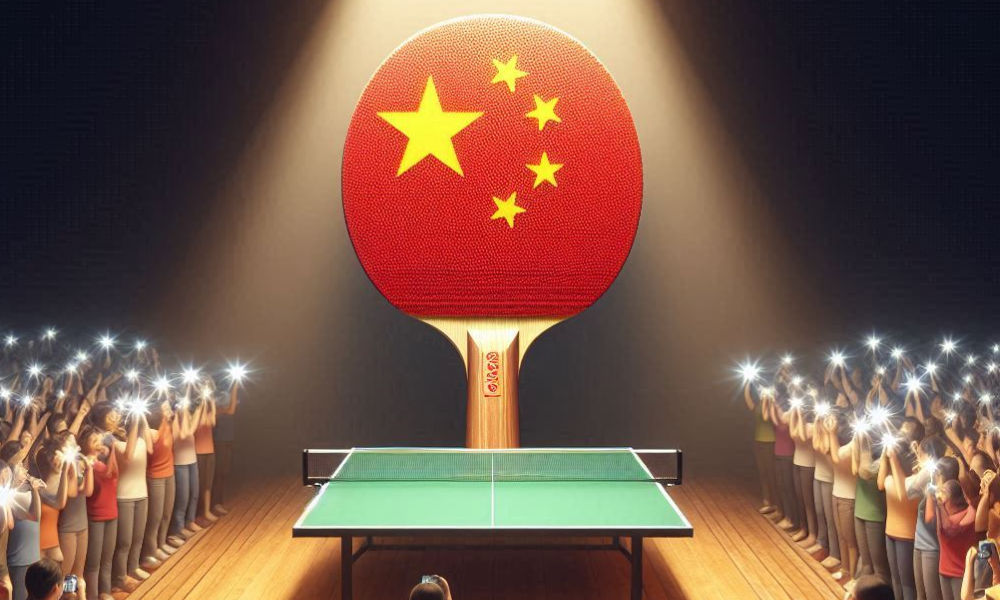
During the Paris Olympics, not a day went by without table tennis making its way onto Weibo’s trending lists. The Chinese table tennis team achieved great success, winning five gold medals and one silver.
However, the women’s singles final on August 3rd, between Chinese champions Chen Meng (陈梦) and Sun Yingsha (孙颖莎), took viewers by surprise due to the unsettling atmosphere. The crowd overwhelmingly supported Sun Yingsha, with little applause for Chen Meng, and some hurled insults at her. Even the coaching staff had stern expressions after Chen’s win.
This bizarre scene sparked heated discussions on Chinese social media, exposing the broader audience to the chaotic and sometimes absurd dynamics within China’s table tennis fandom.
“I welcome fans but reject fandom culture.”
When Sun Yingsha and Chen Meng faced off in the women’s singles final, the medal was destined for ‘Team China’ regardless of the outcome; the match should have been a celebration of Chinese table tennis.
However, the match held significant importance for both Sun and Chen individually. Chen Meng, the defending champion from the previous Olympics, was on the verge of making history by retaining her title. Meanwhile, Sun Yingsha, an emerging star who had already claimed singles titles at the World Cup and World Championships, was aiming to complete a career Grand Slam (World Championships, World Cup, and Olympics).
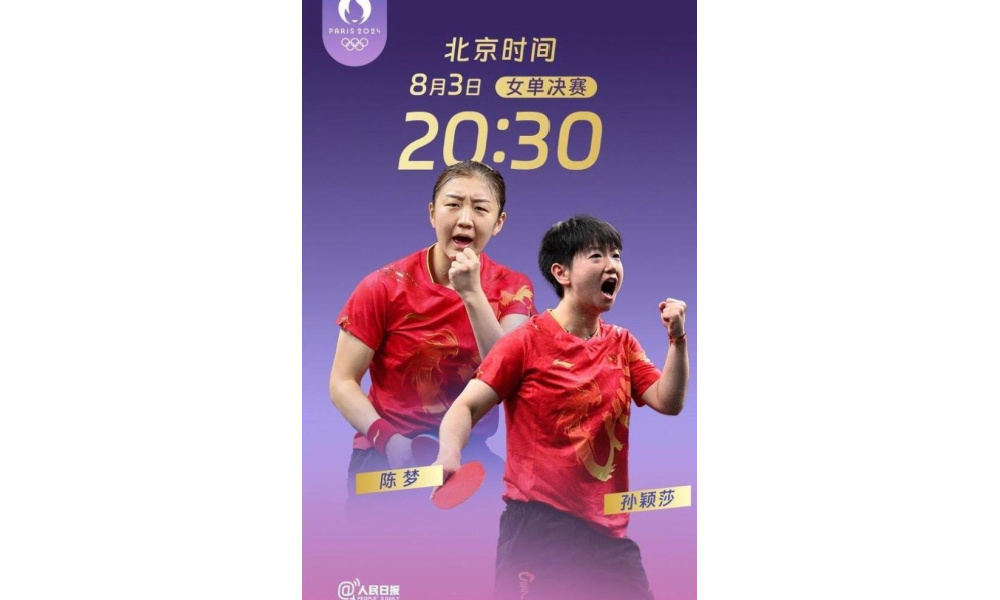
[center] Announcement of the Chen (L) vs Sun (R) match by People’s Daily on social media.[/center]
Sun Yingsha has clearly become a public favorite. On Weibo, the table tennis star ranked among the most beloved athletes in popularity lists.
This favoritism among Chinese table tennis fans was evident at the venue. According to reports from a Chinese audience member, anyone shouting “Go Chen Meng!” (“陈梦加油”) was quickly silenced or booed, while even cheering “Come on China!” (“中国队加油”) was met with ridicule. After Chen Meng’s 4-2 victory, many in the audience expressed their frustration and chanted “refund” during the award ceremony. Meanwhile, social media was flooded with hateful posts cursing Chen for winning the match.
For many who were unfamiliar with the off-court drama, the influence of fandom culture on the Olympics was shocking. However, in the world of Chinese table tennis, such extreme fan behavior has been brewing for some time. Even during the eras of Ma Long (马龙) and Zhang Jike (张继科), there were already fans who would turn against each other and others.
This year’s men’s singles champion, Fan Zhendong (樊振东), had long noticed the growing influence of fandom culture. In recent years, he has repeatedly voiced his discomfort with fan activities like “airport send-offs” and “fan meet-and-greets.” Earlier this year, he took to social media to reveal that he and his loved ones were being harassed by both overzealous fans and haters, and that he was considering legal action. He made it clear: “I welcome fans but reject fandom culture.” His consistent stance against fandom has helped cultivate a relatively rational fan base.
“What has happened to Chinese table tennis fans over the years?”
On Weibo, a blogger (@3号厅检票员工) posed a question that struck a chord with many, garnering over 30,000 likes: “What has happened to Chinese table tennis fans over the years?”
In the comments, many blamed Liu Guoliang (刘国梁) for fueling the fan culture around table tennis. Liu, the first Chinese male player to achieve the Grand Slam, retired in 2002 and then became a coach for the Chinese table tennis team. His coaching career has been highly successful, leading players like Ma Long and Xu Xin (许昕) to numerous championships.
Beyond coaching, Liu has been dedicated to commercializing table tennis. Compared to international tournaments in sports like tennis or golf, the prize money for Chinese table tennis players is only about one-tenth of those sports. Fan Zhendong has publicly stated on Weibo that the prize money for their competitions is too low compared to badminton. Liu believes table tennis has significant untapped commercial potential that has yet to be fully realized.
Under Liu’s leadership, the commercialization of the Chinese table tennis team began after the Rio Olympics, where China won all four gold medals. Viral internet memes like “Zhang Jike, wake up!” (继科你醒醒啊) and “The chubby guy who doesn’t understand the game” (不懂球的胖子) made both the sport and its athletes wildly popular in China.
Seeing the opportunity, Liu quickly increased the team’s exposure, encouraging players to create Weibo accounts, do live streams, star in films, and participate in variety shows. This approach rapidly turned the Chinese table tennis team into a “super influencer” in the Chinese sports world.
While this move has certainly increased the athletes’ visibility, it has also drawn criticism: is this kind of commercialization and celebrity status the right path for China’s table tennis? Successful commercialization requires a mature system for talent selection, team building, and athlete management. However, the selection process in Chinese table tennis remains opaque, the current team-building system shows little promise, and young athletes struggle to break through.
Additionally, athlete management appears amateurish. After watching an interview with Chinese tennis player Zheng Qinwen (郑钦文), a Douban netizen commented that Liu Guoliang’s plan for commercializing athletes is highly unprofessional—relying mainly on their personal charisma to attract attention. The most common criticism is that Liu and the Table Tennis Association should let professionals handle the professional work. Without a solid foundation for commercialization, the current focus on hype and marketing in Chinese table tennis may temporarily boost ticket sales but could ultimately backfire.
“Didn’t you say you want to crack down on fan culture?”
In response to the controversy surrounding the Chen vs. Sun match, the Beijing Daily published an article titled “How Can We Allow Fandom Violence to Disturb the World of Table Tennis?” The article addressed the growing problem of “fandom culture” infiltrating table tennis, a trend that originated in the entertainment world. It highlighted how extreme fan behavior, including online abuse and disruptive actions during matches, harms both the sport and the mental well-being of athletes. While fan enthusiasm is important, the article stressed that it must remain within rational limits.
This article foreshadowed actions taken shortly after. On August 7th, China’s Ministry of Public Security announced an online crackdown on chaotic sports-related fan circles. Social media platforms responded swiftly: Weibo deleted over 12,000 posts and banned more than 300 accounts, while Xiaohongshu, Bilibili, and Migu Video removed over 840,000 posts and banned or muted more than 5,300 accounts.
The campaign against fan culture sparked online debate. Some netizens criticized the official stance on “fandom” as overly simplistic. The Chinese term for “fandom,” 饭圈 (fànquān), contains a homophone for “fan,” referring to enthusiastic supporters of celebrities. In contemporary Chinese discourse, the term is often linked to the idol industry and carries negative, gender-biased connotations, particularly towards “irrational female fans chasing male idols.”
One Weibo post argued that commercialized sports, like football, are inherently tied to fan loyalty, belonging, and exclusivity. Disruptions among fans are not solely due to “fandom” but are often influenced by larger forces, such as capital or authorities. In the table tennis final, even the coaching team’s dissatisfaction with Chen Meng’s victory points to underlying problems beyond fan behavior.
While public backlash against “fandom” in sports often stems from concerns over its toxicity and violence, as blogger Yuyu noted, internal conflicts and power struggles have always existed in competitive sports. Framing these issues solely as “fandom problems” risks oversimplifying the situation and overlooks challenges such as commercialization failures, poor youth development, and internal factionalism within sports teams. The simplistic blame on “fandom culture” is seen by some as a distraction from these real issues, further fueling public frustration.
This public frustration is evident in a 2019 Weibo post and hashtag from People’s Daily. The five-year-old post personified China as a young male idol, promoting patriotism through fandom culture with the slogan “We all have an idol named ‘A Zhong’ (#我们都有一个爱豆名字叫阿中#)” [‘A Zhong’ was used as a nickname to refer to a personified China]. This promotion of ‘China’ as an idol with a 1.4 billion ‘fandom’ resurfaced during the Hong Kong protests.

Hashtag: “We all have an idol named Azhong” [nickname for China]
Now, after state media harshly criticized fandom culture, netizens have revisited the post, bringing it back into the spotlight. Recent comments on the post are filled with sarcasm, highlighting how fandom is apparently embraced when convenient and scapegoated when problems arise.

Post by People’s Daily promoting China as an “idol.”
“Didn’t you say you wanted to crack down on fan culture?” one commenter wondered.
Chen Meng, the Olympic table tennis champion, has also addressed the fan culture surrounding the 2024 Paris matches. She expressed her hope that, in the future, fans will focus more on the athletes’ “fighting spirit” on the field. True sports fans, she suggested, should be able to celebrate when their favorite athlete wins and accept it when they lose. “Because that’s precisely what competitive sports are all about,” she said.
By Ruixin Zhang
edited for clarity by Manya Koetse
Independently reporting China trends for over a decade. Like what we do? Support us and get the story behind the hashtag by subscribing:
Spotted a mistake or want to add something? Please let us know in comments below or email us. First-time commenters, please be patient – we will have to manually approve your comment before it appears.
©2024 Whatsonweibo. All rights reserved. Do not reproduce our content without permission – you can contact us at info@whatsonweibo.com.
Ruixin is a Leiden University graduate, specializing in China and Tibetan Studies. As a cultural researcher familiar with both sides of the 'firewall', she enjoys explaining the complexities of the Chinese internet to others.

You may like
China ACG Culture
“Black Myth: Wukong”: From Gaming Screens to the CMG Spring Festival Gala?
Published
1 month agoon
January 21, 2025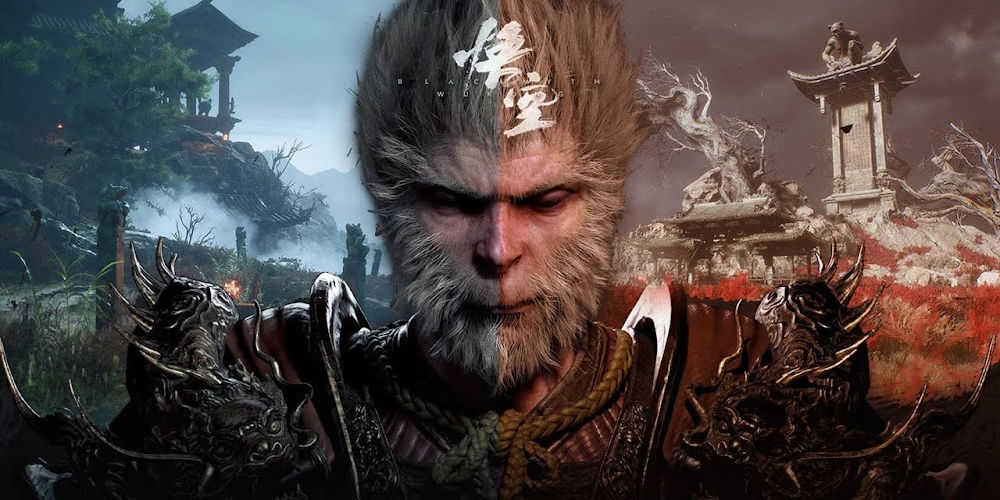
FROM THE WEIBO WATCH PREMIUM NEWSLETTER
Is Chinese game sensation ‘Black Myth Wukong’ making a jump from gaming screens to the CMG Spring Festival Gala? There’s already some online excitement over a potential performance at the biggest liveshow of the year.
The countdown to the most-watched show of the year has begun. On January 29, the Year of the Snake will be celebrated across China, and as always, the CMG Spring Festival Gala, broadcast on CCTV1, will air on the night leading up to midnight on January 28.
Rehearsals for the show began last week, sparking rumors and discussions about the must-watch performances this year. Soon, the hashtag “Black Myth: Wukong – From New Year’s Gala to Spring Festival Gala” (#黑神话悟空从跨晚到春晚#) became a topic of discussion on Weibo, following rumors that the Gala will feature a performance based on the hugely popular game Black Myth: Wukong.
Three weeks ago, a 16-minute-long Black Myth: Wukong performance already was a major highlight of Bilibili’s 2024 New Year’s Gala (B站跨年晚会). The show featured stunning visuals from the game, anime-inspired elements, special effects, spectacular stage design, and live song-and-dance performances. It was such a hit that many viewers said it brought them to tears. You can watch that show on YouTube here.
While it’s unlikely that the entire 16-minute performance will be included in the Spring Festival Gala (it’s a long 4-hour show but maintains a very fast pace), it seems highly possible that a highlight segment of the performance could make its way to the show.
Recently, Black Myth: Wukong was crowned 2024’s Game of the Year at the Steam Awards. The game is nothing short of a sensation. Officially released on August 20, 2024, it topped the international gaming platform Steam’s “Most Played” list within hours of its launch. Developed by Game Science, a studio founded by former Tencent employees, Black Myth: Wukong draws inspiration from the classic Chinese novel Journey to the West. This legendary tale of heroes and demons follows the supernatural monkey Sun Wukong as he accompanies the Tang Dynasty monk Xuanzang on a pilgrimage to India to retrieve Buddhist scriptures. The game, however, focuses on Sun Wukong’s story after this iconic journey.
The success of Black Myth: Wukong cannot be overstated—I’ve also not seen a Chinese video game be this hugely popular on social media over the past decade. Beyond being a blockbuster game it is now widely regarded as an impactful Chinese pop cultural export that showcases Chinese culture, history, and traditions. Its massive success has made anything associated with it go viral—for example, a merchandise collaboration with Luckin Coffee sold out instantly.
If Black Myth: Wukong does indeed become part of the Spring Festival Gala, it will likely be one of the most talked-about and celebrated segments of the show. If it does not come on, which we would be a shame, we can still see a Black Myth performance at the pre-recorded Fujian Spring Festival Gala, which will air on January 29.

Lastly, if you’re not into video games and not that interested in watching the show, I still highly recommend that you check out the game’s music. You can find it on Spotify (link to album). It will also give you a sense of the unique beauty of Black Myth: Wukong that you might appreciate—I certainly do.
By Manya Koetse
(follow on X, LinkedIn, or Instagram)
Spotted a mistake or want to add something? Please let us know in comments below or email us. First-time commenters, please be patient – we will have to manually approve your comment before it appears.
©2025 Whatsonweibo. All rights reserved. Do not reproduce our content without permission – you can contact us at info@whatsonweibo.com.
Chinese Movies
Why Chinese Hit Movie “Her Story” is ‘Good Stuff’: Stirring Controversy and Celebrating Female Perspectives
China’s end-of-year movie hit, Her Story, is sparking debates and highlighting the rising influence of Chinese female directors.
Published
3 months agoon
December 7, 2024
The Chinese comedy-drama Her Story (好东西, literally “Good Stuff”), directed by Shao Yihui (邵艺辉), has been gaining attention and sparking discussions on Weibo since its late November release in mainland China.
The film features an all-star cast including Song Jia (宋佳), Zhong Chuxi (钟楚曦), Zeng Mumei (曾慕梅), Zhao Youting (赵又廷), and Zhang Yu (章宇). It tells a quirky yet heartfelt story about two women: Wang Tiemei (王铁梅), a self-reliant single mom juggling life and work, and Xiao Ye (小叶), a free-spirited young woman navigating her chaotic relationships.
Their friendship begins when Xiao Ye starts babysitting Tiemei’s nine-year-old daughter, Wang Moli (王茉莉). Xiao Ye introduces her drummer friend, Xiao Ma (小马), to teach Moli how to play the drums, but Xiao Ma’s presence stirs jealousy in Tiemei’s unemployed ex-husband, who schemes to regain his place in the family. Blending humor with poignant insights, the film explores themes of imperfect love, friendship, and the messy process of rebuilding lives.
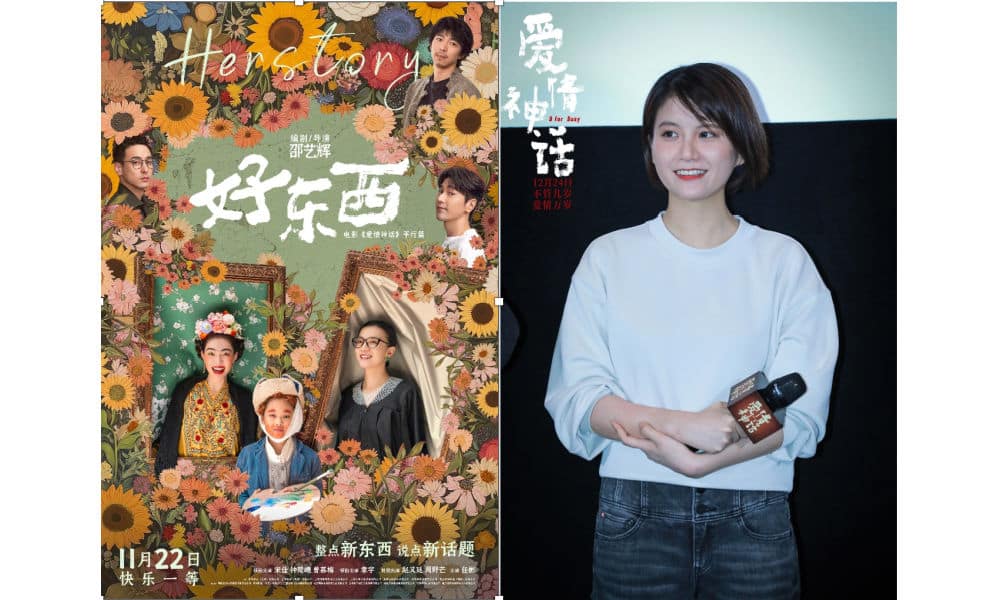
(“Her Story” poster and the director Shao Yihui)
The film also addresses a range of hot societal issues through dialogues woven into everyday interactions, touching on topics like menstruation stigma, sexual consent, feminism, and how family dynamics can impact personal development.
In just eight days, Her Story surpassed 300 million RMB ($41 million) at the Chinese box office (#好东西票房破3亿#). Two days later, on December 2, it exceeded 400 million RMB (#好东西票房破4亿#), and on December 7 news came out that it had surpassed the 500 million RMB ($68.7 million) mark at the box office.
The film also achieved an impressive 9.1/10 rating on Douban, a Chinese platform similar to IMDb, making it the highest-rated domestic film on Douban in 2024.
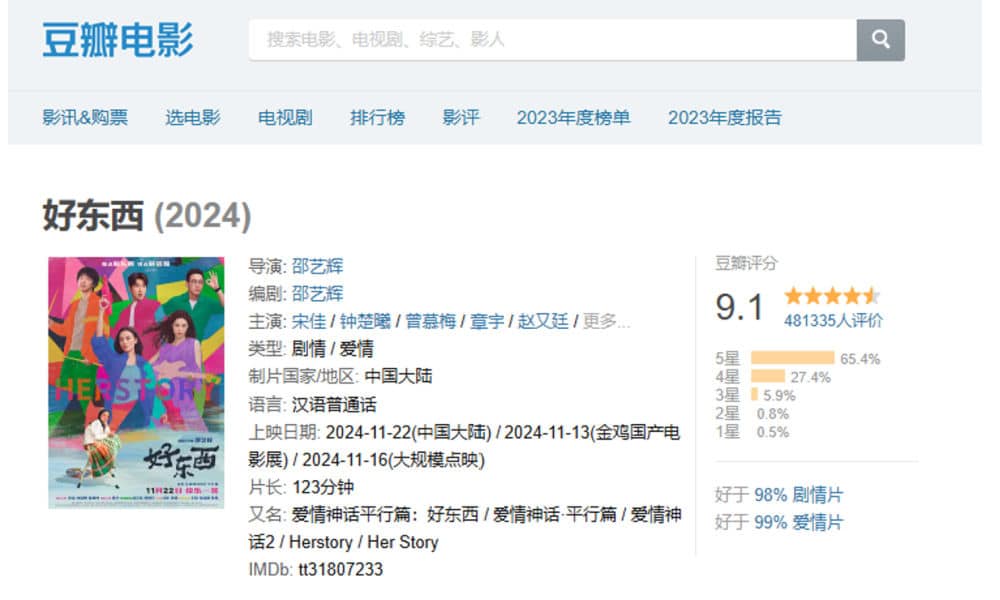
(“Her Story” on Douban)
Notably, 65.4% of voters awarded it five stars, while only 0.5% gave it one star.
Conflicting Views: From Feminist Film to Chick Flick
Despite its huge success, it is almost unavoidable for a movie this big to come without controversy. The film sparked debate on Hupu (虎扑), a platform focused on sports and men’s lifestyle, where it received a lower score of 5/10. While 33.1% of users gave it five stars, 58.4% rated it one star, reflecting divided opinions.
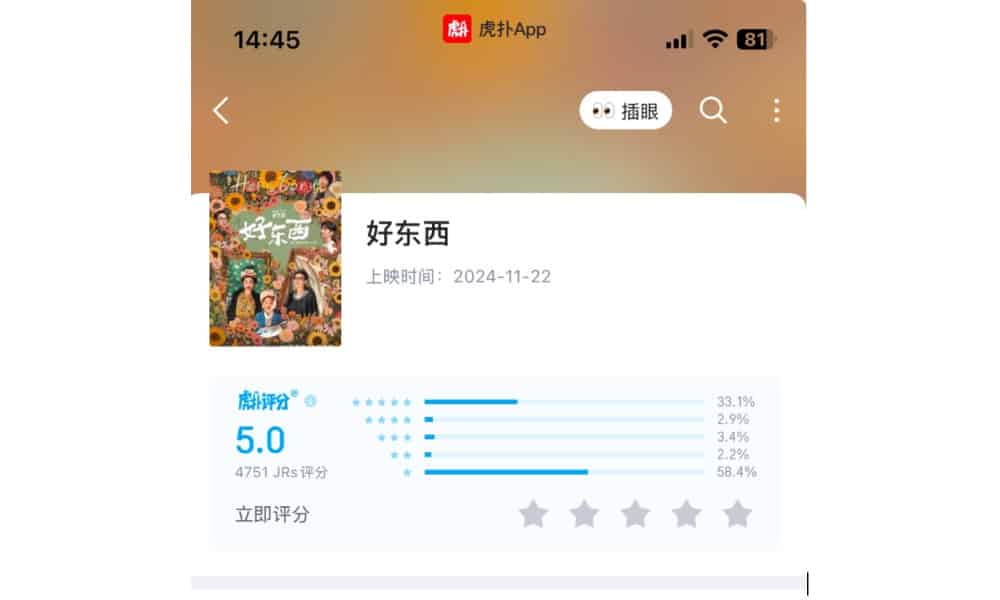
(“Her Story” on Hupu)
Much of the criticism comes from male viewers who feel the film undermines men by portraying them in non-traditional ways and omitting proper names for male characters, such as referring to the ex-husband only as “the ex-husband” (前夫). On the other hand, many female viewers resonate with the film’s female-centered perspective, with one scene blending household sounds and Xiao Ye’s recordings praised as a standout cinematic moment of 2024.
Interestingly, not all women appreciated the film either. A Weibo user, identified as a female scriptwriter for two Chinese TV dramas, emphasized that most of the producers of the film are male. She accused the director of hypocrisy, claiming Shao accepts money and resources from privileged men to create films that encourage female audiences to look down on average men.
She wrote, “I hope that everyone who believes in the ‘ghg’ [girl help girl] myth and supports female idols will also congratulate the male producers who will earn a lot of money from the film.”
Zhou Liming (周黎明), one of China’s most influential film critics, noted two extreme perspectives in film reviews. Some critics label the film as a “boxer film” (拳师电影) or an “extreme feminist film.”
However, the film itself suggests otherwise, as reflected in Moli’s line, “I don’t want to box,” when her father tries to convince her to take up boxing. Some audiences interpreted the line as rejecting extreme feminist messages.
In China, the term “boxer” (拳师) is used to critique certain feminists. The second character in the word for feminists (“权” [quán] in 女权主义者) is pronounced the same as the first character in “boxer” (“拳” [quán] in 拳师). This term often mocks behaviors seen as overly aggressive or lacking nuance in feminist discourse, such as avoiding dialogue or oversimplifying social issues.
Some also dismissed the film as a “chick flick,” a casual term for romantic comedies, which Zhou argued unfairly minimizes its significance. He likened the film to Woody Allen’s Annie Hall, suggesting that, much like Allen’s work, Her Story transcends gender differences and reflects the cultural zeitgeist of its time.
Despite the controversy, the film has been praised by notable figures like actor Zhang Ruoyun (张若昀), who called it “super good, super awesome, and super cute” (“超级好、超级牛、超级可爱的东西”). Zhang described the movie as tackling absurd yet realistic issues from a female perspective with humor and depth.
The Increasing Influence of Female Directors in China
At the end of Her Story, Tiemei’s daughter, Moli, nervously prepares for her first drum performance. Despite her hesitation, she gathers her courage and steps on stage. This moment reminded some viewers of a similar scene in another female-directed film this year, YOLO (麻辣滚烫), where the protagonist gears up for a boxing match.
YOLO is a 2024 comedy-drama directed by Jia Ling (贾玲), starring Jia Ling and Lei Jiayin (雷佳音). A comedic adaptation of the Japanese film 100 Yen Love (2014), it tells the story of Du Leying (杜乐莹), a woman facing personal struggles who turns to boxing after meeting coach Hao Kun (昊坤). Through her journey, she finds a new direction in life after their breakup. Grossing USD 496 million worldwide, YOLO became the highest-grossing Chinese film of 2024.
These parallels between Her Story and YOLO highlight a broader trend: the growing prominence of female directors in Chinese cinema. Beyond the discussions of plot and central themes, Her Story reflects the increasing success and influence of women filmmakers in the industry.
In 2024, female directors have made a notable impact on Chinese cinema, with their films achieving both critical acclaim and box office success. Their works also spark conversations about the need for more diverse perspectives in the industry.
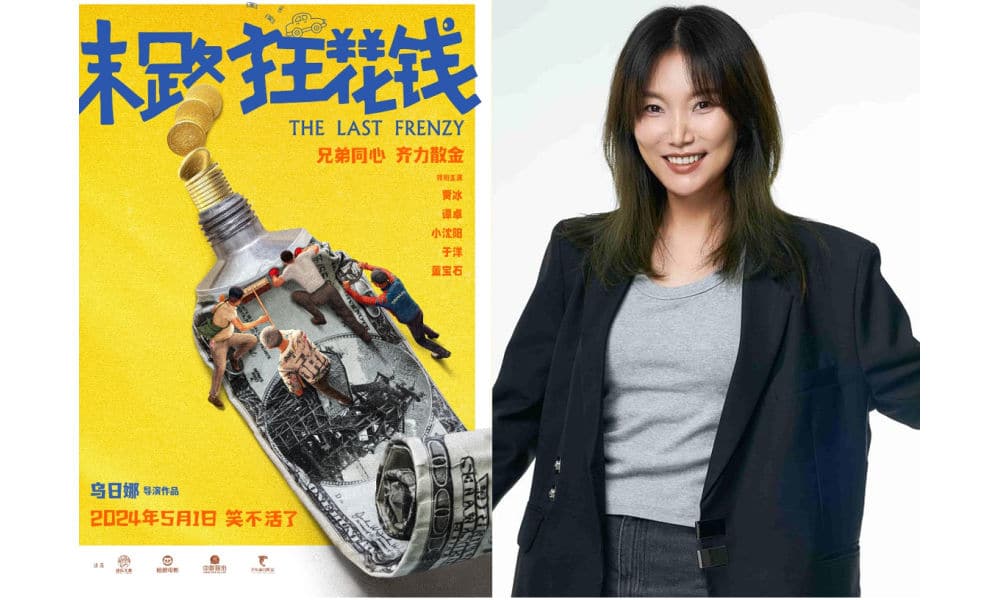
(“The Last Frenzy” poster and the director Wu Rina)
The Last Frenzy (末路狂花钱), directed by Wu Rina (乌日娜), premiered on May 1. This comedy follows Jia Youwei (贾有为), a man diagnosed with a terminal illness, who decides to sell his assets and live fully with his friends. Despite mixed reviews and a Douban score of 5.9, the film grossed over 700 million RMB ($96 million) by May 31, becoming a major box office hit.

(“Stand By Me” poster and the director Yin Ruoxin)
Stand By Me (野孩子, literally “Wild Kids”), directed by Yin Ruoxin (殷若昕), premiered on September 13. Starring Wang Junkai (王俊凯), it tells the story of two neglected children, Ma Liang (马亮) and Xuan Xuan (轩轩), who form a makeshift family while facing life’s challenges. With a Douban rating of 6.7, the film grossed 241 million RMB by October 9.
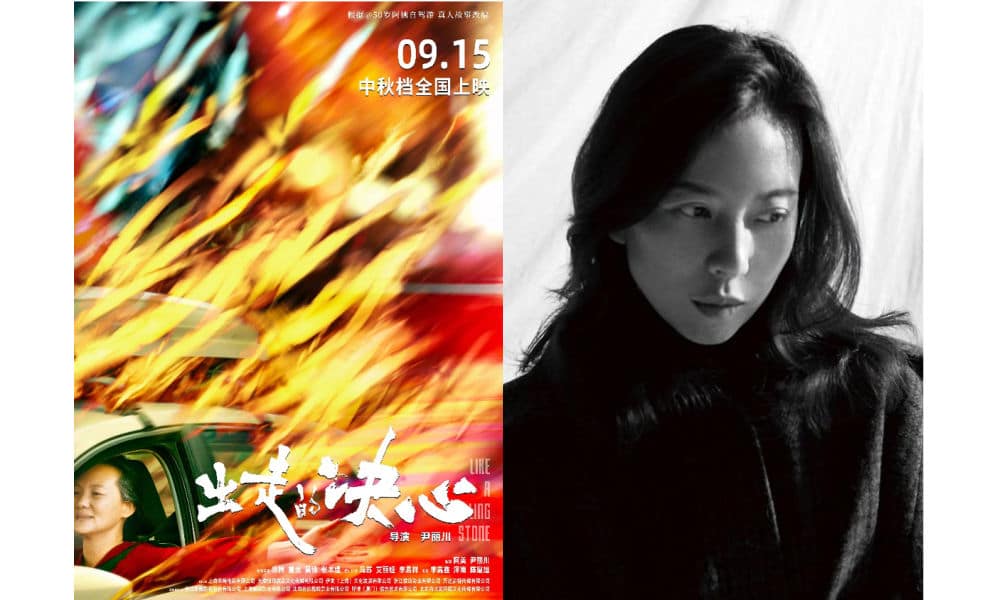
(“Like A Rolling Stone” poster and the director Yin Lichuan)
Like A Rolling Stone (出走的决心, literally “The Determination to Leave”), directed by Yin Lichuan (尹丽川), premiered the same week as Stand By Me. Inspired by Su Min (苏敏), a 50-year-old woman who embarked on a solo road trip, the film explores themes of self-discovery and the struggles of neglected women. Featuring Yong Mei (咏梅), the film earned praise for its authenticity, achieving a Douban score of 8.8 and grossing over 123 million RMB.
To the Wonder (我的阿勒泰, literally “My Altay”), a film-like TV drama directed by Teng Congcong (滕丛丛), adapts Li Juan’s (李娟) memoir. Starring Ma Yili (马伊琍), it tells the story of Li Wenxiu (李文秀), a young woman finding her place in her hometown of Altay after setbacks in the big city. Known for its poetic storytelling and portrayal of ethnic harmony, the series has a Douban score of 8.9 from over 300,000 ratings, ranking among the top dramas of 2024.
“An Era Where Women Are Being Seen”
The growing influence of female directors has sparked discussions about how women’s perspectives are challenging traditional storytelling.
Some Weibo users compared a scene from Her Story, where Tiemei scolds a man for urinating roadside, to a similar moments in YOLO. In YOLO, Hao Kun’s attempt to urinate roadside is humorously interrupted by car headlights. Such scenes highlight how female directors reinterpret everyday behaviors, inviting audiences to question societal norms.
Her Story has already been released in several countries, including the United States, Australia, Germany, and the United Kingdom, with more international releases to follow.
The success of Her Story, the conversations it inspires, and its contribution to highlighting female perspectives in film reflect the evolving dynamics of contemporary cinema and the strengthening of female voices in traditionally male-dominated industries.
On Weibo, many view this as a positive development. One commenter wrote:
“Her Story [好东西/”Good Stuff”] is truly ‘good stuff.’ (..) At the start of this year, I watched YOLO, and at the end of this year, I watched Her Story. Suddenly, I feel very grateful to live in this era—the era where women are gradually being ‘seen.’ Both films hold very special meaning for me. It feels like everything has come together perfectly. I hope to see more outstanding works from female directors in the future, and I look forward to an era where there’s no gender opposition, only mutual equality.”
By Wendy Huang
Follow @whatsonweibo
Edited for clarity by Manya Koetse
Spotted a mistake or want to add something? Please let us know in comments below or email us. Please note that your comment below will need to be manually approved if you’re a first-time poster here.
©2024 Whatsonweibo. All rights reserved. Do not reproduce our content without permission – you can contact us at info@whatsonweibo.com
What’s on Weibo Chapters
Subscribe

From Weibo to RedNote: The Ultimate Short Guide to China’s Top 10 Social Media Platforms

Collective Grief Over “Big S”

Tuning Into the Year of the Snake

The ‘China-chic Girl’ Image and the Realities of China’s Competitive Food Delivery Market

From “Public Megaphone” to “National Watercooler”: Casper Wichmann on Weibo’s Role in Digital China

Our Picks: Top 10 Chinese Buzzwords and Phrases of 2024 Explained

“Dear Li Hua”: The TikTok/Xiaohongshu Honeymoon Explained

Why Chinese Hit Movie “Her Story” is ‘Good Stuff’: Stirring Controversy and Celebrating Female Perspectives

Chiung Yao’s Suicide Farewell Letter: An English Translation

12-Year-Old Girl from Shandong Gets Infected with HPV: Viral Case Exposes Failures in Protecting Minors

Breaking the Taboo: China’s Sanitary Pad Controversy Sparks Demand for Change

Weibo Watch: Christmas in China Is Everywhere and Nowhere

Weibo Watch: A New Chapter

Weibo Watch: China’s Online Feminism Is Everywhere

Story of Chinese Female MA Graduate Going Missing for 13 Years Sparks Online Storm
Get in touch
Would you like to become a contributor, or do you have any tips or suggestions? Get in touch here!
Popular Reads
-

 China Insight10 months ago
China Insight10 months agoThe Tragic Story of “Fat Cat”: How a Chinese Gamer’s Suicide Went Viral
-

 China Music11 months ago
China Music11 months agoThe Chinese Viral TikTok Song Explained (No, It’s Not About Samsung)
-

 China Insight12 months ago
China Insight12 months agoThe ‘Two Sessions’ Suggestions: Six Proposals Raising Online Discussions
-

 China Digital9 months ago
China Digital9 months agoChina’s 2024 Gaokao Triggers Online Discussions on AI




